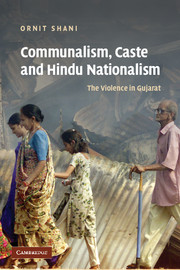Book contents
- Frontmatter
- Contents
- Acknowledgements
- Glossary
- List of abbreviations
- Map of Ahmedabad
- Introduction
- Part I The background
- 1 Setting the scene
- 2 The politics and discourse of reservations and caste
- Part II The 1985 Ahmedabad riots: the historical conjunction between caste conflicts and communalism
- Part III The making of ethnoHinduism
- Bibliography
- Index
2 - The politics and discourse of reservations and caste
Published online by Cambridge University Press: 04 December 2009
- Frontmatter
- Contents
- Acknowledgements
- Glossary
- List of abbreviations
- Map of Ahmedabad
- Introduction
- Part I The background
- 1 Setting the scene
- 2 The politics and discourse of reservations and caste
- Part II The 1985 Ahmedabad riots: the historical conjunction between caste conflicts and communalism
- Part III The making of ethnoHinduism
- Bibliography
- Index
Summary
Reservation policies for lower and backward castes became a major source of conflict among Hindus from the end of the 1970s in Gujarat as well as elsewhere in India. The riots in Ahmedabad in 1985 erupted over the decision of the Gujarat government to increase the quotas reserved for backward castes in educational institutions and government jobs. This conflict between forward- and backward-caste Hindus over social and economic reforms for the benefit of backward castes turned into communal violence between Hindus and Muslims. This occurred despite the fact that the local Muslims had no part in the reservation dispute, there was no prior religious tension between the two communities, and religion was not a category qualifying a person for reservation of places in educational and governmental institutions. This chapter examines how and why caste disputes over government preferential policies for the benefit of the lower- and backward-caste Hindus escalated into tensions between Hindus and Muslims.
Reservations provided growing opportunities for the lower and backward castes in representative bodies, professional courses and government jobs. The access of lower and backward castes to a higher social echelon through reservations was perceived as potentially undermining the superior status of upper castes. Reservation policies, therefore, generated uncertainties within the Hindu moral order and resulted in the growth of tensions between forward- and backward-caste Hindus. These policies entangled caste and class issues and were shaped on the basis of caste and class deliberations. Policy makers, politicians and the judiciary, in their designation and discourse of reservations, addressed issues of equality on the basis of caste and class considerations as if they were synonymous with the rights of religious minorities.
- Type
- Chapter
- Information
- Communalism, Caste and Hindu NationalismThe Violence in Gujarat, pp. 52 - 76Publisher: Cambridge University PressPrint publication year: 2007

